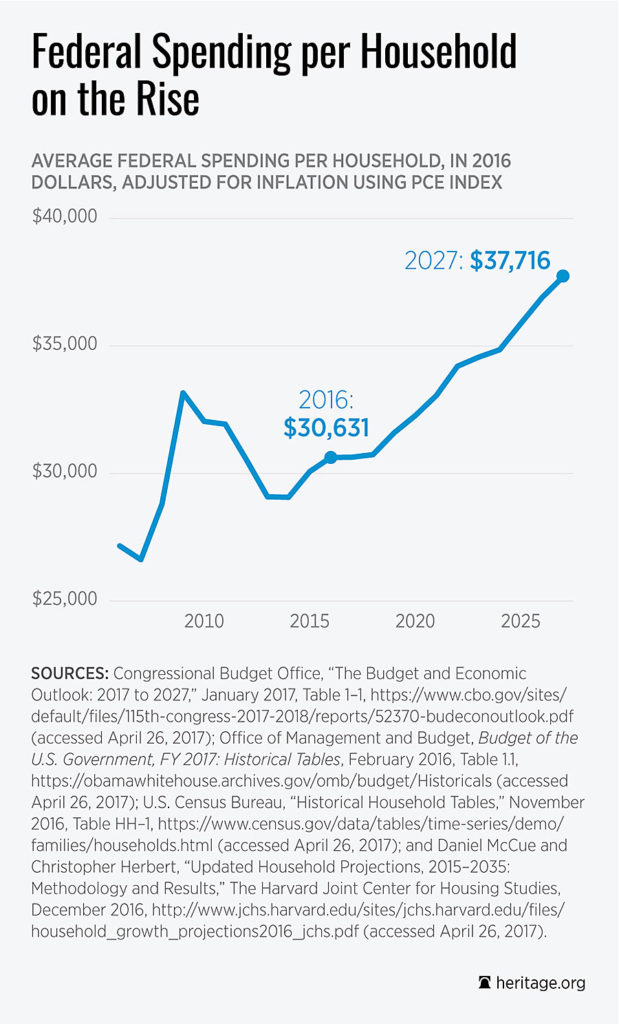Your Household Share of Federal Spending Keeps on Rising. Here’s the Solution.
Patrick Tyrrell /
It’s sometimes hard to fully visualize a massive sum of money.
Take $3.854 trillion for instance—the amount the federal government spent in 2016. That’s a lot of money, but America is a large country.
It may be easier to picture if we knew how much spending each household would be responsible for if households all put aside an equal amount each year to cover the government’s spendthrift ways.
This can also tell us what the average household should be receiving back in goods and services from the government for their tax dollars.
The following chart shows the estimated federal spending per household in the U.S. from 2006 to 2027.
The years 2017-2027 are based on the Congressional Budget Office’s January 2017 baseline projections of federal outlays, and estimates from a Harvard study of the number of households likely to be in the U.S. each year.
If every household in the U.S. paid an equal amount to cover the federal government’s spending in 2016, each household would have paid $30,631 that year alone.
In the same 2016 inflation-adjusted dollars, each household is now paying 15 percent more than 10 years ago, when the household share of federal spending was $26,622.
This per household figure will only grow larger, according to official government projections. In 2027, each household’s share of annual spending will have jumped by another 23 percent to $37,715.
Right now is a good time to ask whether the federal government is a good steward of our tax dollars. Do taxpayers get enough bang for their buck when they pay federal taxes?
If households are not receiving $30,631 on average in the form of goods and services from their government, they are being shortchanged.
Yet the federal government borrows more money each year to fly out its oversized doors.
Federal government deficit spending—the money it spends beyond what it collects in revenues—amounted to $587 billion in 2016, or $4,665 per household.
The Heritage Foundation has a solution in its “Blueprint for Balance” proposal.
In addition to slowing the growth in spending while continuing to fully fund national defense, the plan would cut taxes by $1 trillion over 10 years, cut the deficit by $9 trillion over 10 years, and balance the budget in seven years.
That’s important because, as the report notes:
Americans have reached a critical point. The federal government has grown to an unprecedented size, has expanded its scope to virtually every part of the economy, and is on a dangerous fiscal trajectory. Taxpayers pay enormous amounts of money to the government, and the government borrows huge sums beyond the amount it takes from taxpayers. The government uses taxes and borrows money to pay for excessive spending, including many programs that benefit the well-connected or lock people into low incomes by penalizing work. As of March 2017, the national debt is approaching $20 trillion. According to the Congressional Budget Office, if the government remains on its currently planned trajectory, it will spend at least another $10 trillion more than it will collect over the 2017 to 2027 period, piling on even more debt.
Annual debt-service payments are expected to double within five years, and more than triple over the next 10 years, increasing from $241 billion in 2016 to $768 billion in 2027. That $768 billion in interest that the government must pay in 2027 represents 52 percent of the entire amount of the discretionary spending projected for the government that year. The country cannot and should not sustain the current course of excessive spending and borrowing.
The time has come for the federal government to spend within its means. The Heritage Foundation’s “Blueprint for Balance” is the pathway out of the engulfing national debt.

